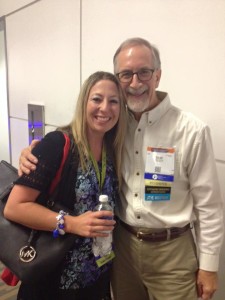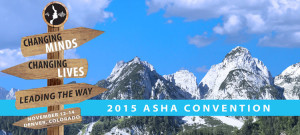ASHA 2015: Conference Takeaways!
Wow! I just completed a whirlwind three day national speech conference called the ASHA convention. ASHA stands for the American Speech/Language Hearing Association, and it is the association that certifies SLP’s. That CCC behind our name (i.e. Laura Smith MA. CCC-SLP) is from ASHA in case you have ever wondered.
I’ve never been to ASHA before because it’s usually extremely expensive and somewhere to which I would have to fly. It has never really been in the cards for me. However, this year, it came to Denver! My friend in Syracuse always tells me “Everything comes to Denver!” lol It never felt like it before, but I am definitely riding the high of it now!
Though Cody is convinced I only go to “play with my friends” it’s only partly true. Those friends are the only group of people who love talking about speech pretty much 24/7. It’s hard to nerd out on speech stuff with anyone else but a group of SLP’s!
Okay so anyway, conference takeaways…..
Informational
I spent a lot of time updating my knowledge of Assistive Technology. Not only do I see a lot of device users in the school, but assistive technology can and should be an important option when a child with apraxia is still non-verbal or minimally verbal. Assistive technology is a dynamic and changing field. The very word technology should allude to the fact SLP’s should be staying on top of this if they are working with device users because technology inherently changes very quickly.
I learned that there is a raging debate between two theoretical perspectives in this field. One group highly believes in the use of using only core words to start, adding in fringe and content specific vocabulary later; and another group believes in using more content specific words to start. Though I do see both sides, and used more content specific 8 years ago, I really see the value and purpose of using a common core. This is a set of words that the child starts with that comprises 75% of adult speech, with the theory being that chances for not only direct instruction, but modeling and exposure can occur throughout the child’s entire day. One common example was with the word “turn.” Turn is a core word that can be used in many different situations and even be a different part of speech. Many of the talks provided a practical framework for SLP’s and special educators to implement.
Reinforcing
It’s always good to have your current knowledge reinforced also in different areas. For me, it’s good to continue to go to talks on apraxia and have reinforced current best practices and diagnostic criteria. The best talk on apraxia was by non other than David Hammer. I’m not just saying that. It was a packed house
and no one left. I have attended his talks before I went to bootcamp, and remember being slightly confused about his therapy that I couldn’t remember all of his activities. Now that I have a solid understanding of the goal for apraxia therapy, I could attend his talk and soak in ALL of his creative ideas for making therapy fun and hopefully transfer that to my current practice! Plus, it was fun to take this picture with him! He is definitely a celebrity in my book!
Puzzling
Of all the talks I attended, the one that was by far the most puzzling was that of Susan Rvachew and Tanya Matthews who were giving a talk on Differential dx of Severe Phonological Disorder and Childhood Apraxia of Speech. It’s probably never good when you start out your talk with the fact that you know people are expecting you to explain the difference based on your title, but that you were probably just as confused. Not exactly a great way to earn credibility.
The talk had people leaving left and right, with others just politely sitting on their phones scrolling through fb or planning out their next session.
I genuinely wanted to hear their perspective, but it was hard to follow and confusing. Of all things confounding was a new term I had not yet heard entitled, “Phonological planning deficit.” Basically, they listed all the characteristics of mild to moderate CAS, called it phonological planning deficit, and then treated it successfully with the principles of motor learning theory that has been proved to help kids with CAS. No wonder they were confused. I was happy to get out of that room!
Thought provoking
A debate within the apraxia community pertains to that of autism spectrum disorder and a co-morbidity of CAS. Some are adamant it rarely occurs together, with yet others convinced there is a motor planning deficit present in so many.
Shelley Velleman is definitely a name in this area who had done the most research surrounding this particular area. I attended her talk about ASD and motor speech and prosodic deficits. The children in her study really didn’t display pure characteristics of CAS, in my opinion, but they definitely exhibited errors with prosody including timing, stress, and pitch deviations. It’s interesting because many of the kids had good articulation but just deficits in prosody, and we currently believe prosodic errors to be a key feature in CAS. This could be a different motor speech area that is new and fascinating. A motor speech disorder NOS maybe since these kids don’t fit in a tidy definition of CAS or dysarthria.
Powerful
Perhaps one of the most powerful talks was moderated by Edythe Strand out of Mayo who created the program DTTC for kids with apraxia which her colleague Ruth Stoeckel once outlined in an interview I did here:
DTTC: Evidence Based Practice in Childhood Apraxia of Speech
She invited two parents to come speak to SLP’s about the parent perspective. You know honestly, I was so proud to be part of the apraxia community professionally and personally in that moment. I believe apraxia is the only speech disorder currently, second to stuttering, that has really taken into account the importance of SLP’s knowing about the family experience. These two mothers shared their heartbreaking experiences. To SLP’s, this is a job. They care, and some care an awful lot, but some just do not realize the pain that an apraxia dx brings and the financial and emotional toll it can take on a family. These two women had ended up divorced. The toll just too much for each of their marriages. I was brought back to bootcamp with Dave Hammer emphatically expressing to us that we should be open with parents and encourage them to take care of their marriage. It was so great for SLP’s to hear this. Edythe Strand wiped away tears as did many others. Fostering that understanding and empathy in SLP’s is something I am so proud of the apraxia pioneers for recognizing and doing. I can’t help think Sharon Gretz, the founder of CASANA has had something to do with that. She has been so open with her own child’s journey she has undoubtedly changed the course of the profession for the better.
Impressions
Yes many of the SLP’s come to play with their friends. But there is more to it than that. These “friends” are the only people who truly understand speech and who can hang in conversation of highly technical, possibly nerdy, speech talk. Also, SLP’s are normal people too and many would probably prefer a nice vacation instead of leaving their families and holing up in a hotel for no other purpose than to continue their education. In short, these people CARE. I care. I love all of my clients and students. We are in this field because we care, not because we don’t. Some kids keep us up on night. Some kids challenge us. We go to these conventions to learn, to network, and to problem solve with the only other people on the planet who know our job like we do. There is power in that. Everywhere I went I saw professionals taking notes, talking about clients, talking about their job. We as SLP’s do that because we care. My daughter’s SLP was there. She’s a veteran, she’s amazing, she’s one of the top SLP’s in my opinion, but she always knows she can learn more and do better. There were hundreds just like her, hopefully including me.
I will close how the president of ASHA closed her letter in which she said Dr. Seuss perhaps said it best,
“Unless someone like you cares a whole awful lot, nothing is going to get better. It’s not.”
I saw and was part of thousands of professionals who care an awful lot, and I can only believe things will get better, it can’t help but not.
